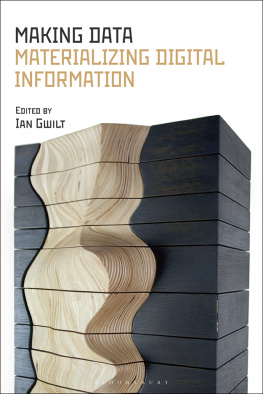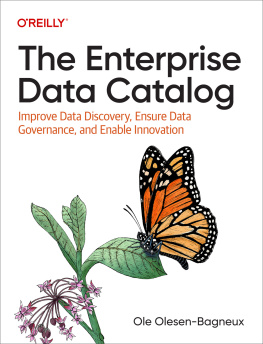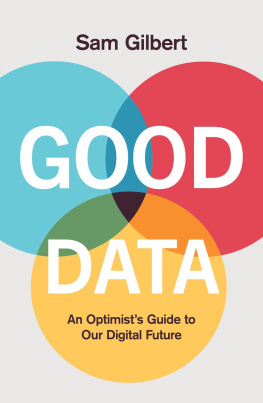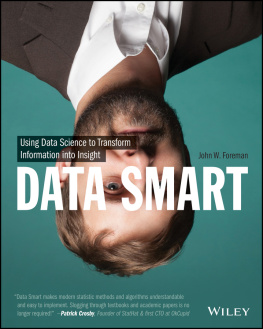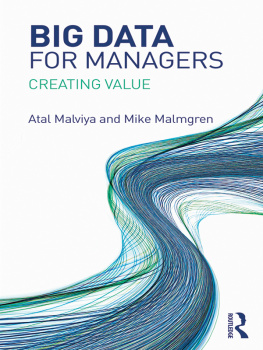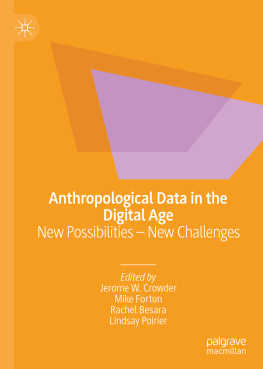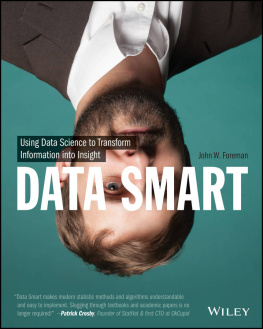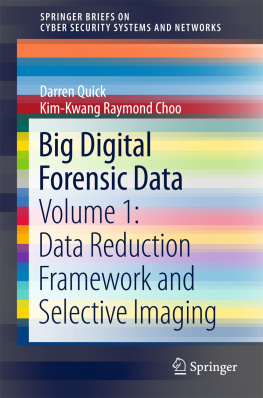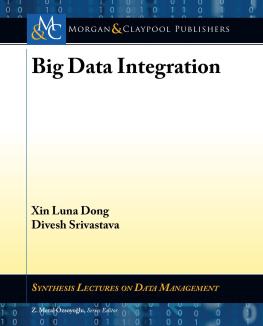MAKING DATA
MAKING DATA
Materializing Digital Information
EDITED BY
IAN GWILT

CONTENTS
Jason Alexander
Jason is Professor of Human-Computer Interaction in the Department of Computer Science at the University of Bath, UK. He has a particular interest in developing novel interactive systems to bridge the physical-digital divide. His recent work focuses on the development of shape-changing interfaces surfaces that can dynamically change their geometry based on digital content or user input and their applications, including the design and implementation of dynamic data physicalizations. His other work has investigated novel interaction techniques using eye-gaze, haptic feedback and gestural interaction.
Yazan Barhoush
Barhoushs work is focused on digital fabrication and virtual reality, as well as software and hardware development for Human-Centred design applications. He is currently employed as a doctoral researcher in the Center for Ubiquitous Computing, at the Faculty of Information Technology and Electrical Engineering at the University of Oulu. He is a member of Associate Professor Georgi Georgievs Design Research group. Barhoush has an international education: a diploma from United World College of the Adriatic (Italy) in 2013, a BSc in Computer Engineering from Union College (NY, USA) in 2017 and an MSc in Computer Science and Engineering from the University of Oulu (Finland) in 2019.
Michele Barker
Michele Barker is a media artist with a strong focus on experimental cinema and responsive media environments as a way of exploring the multifaceted complexities of the human and more than human via perception, embodiment, movement and duration. Her work has been shown extensively both nationally and internationally.
Developing projects that integrate a vast range of technological platforms, Barker has collaborated extensively with Anna Munster for over twenty years, with recent works including vasion, an eight-channel responsive installation working between dance, performance and the moving image; and the multi-channel interactive work, HokusPokus which explores the relations between perception, magic and early moving image technologies and techniques. In the moving image works pull and hold, they use water as mechanism for exploring duration and felt experience. Continuing their preoccupation with duration and felt experience, they are now using drones to delve into what they call geotime, an exploration of time and perception through the lenses of water and land as forces situated outside humans short moment in geological time.
Stephen Barrass
Stephen Barrass is a researcher in Sonic Information Design and Founder of SONIFICATION.COM which is dedicated to using data sonification to make the world a better place. His Doctorate on Auditory Information Design (Australian National University 1996) was one of the first on sonification worldwide, and has been very influential in this field. He initiated the development of the open source Mozzi sonification software for the Arduino microcontroller, and the MozziByte PCB board for rapid prototyping of sonic ideas and embedding sonifications in things. His recent experiments with the 3D printing of data physicalizations modelled on musical instruments provide a new method of Acoustic Sonification that produces interactive sounds from a complete dataset in real time.
Andrew Burrell
Andrew Burrell is a practice-based researcher and educator exploring virtual and digitally mediated environments as a site for the construction, experience and exploration of memory as narrative. His process is one of wording in virtual space visualizing otherwise unseen connections and entanglements. His ongoing research investigates the relationship between imagined and remembered narrative and how the multi-layered biological and technological encoding of human subjectivity may be portrayed within, and informs the design of virtual environments. He is a Senior Lecturer in Visual Communication, faculty of Design, Architecture and Building at the University of Technology Sydney. He lives and works on Gadigal Country.
Aaron Davis
Dr Aaron Davis is an award winning educator, designer and facilitator. Dr Davis works as the Facilitation Manager of NOVELL Redesign at the Florey Institute of Neuroscience and Mental Health, and as a Lecturer and Research Fellow at the University of South Australia. He works across a range of interdisciplinary teams and at the intersection of built environment, community, health and technology. Dr Daviss background is in Architecture but his research interests include social practices, sustainability, innovation and entrepreneurship, the social shaping of technology, and the processes of knowledge formation and sharing.
Nick Dulake
Nick Dulake (MA) is Senior Research Fellow and Industrial Designer at ADMRC/Design Futures, Sheffield Hallam University in the UK. He has more than twenty years of experiences working across diverse market sectors, applying a user-centred and co-design methodology approach to create innovative design solutions. Working in areas such as a digital heritage, wearable medical products and e-health, clients include English Heritage, Kenwood, Adidas, Trulife and Unilever. These collaborations have produced six national/international patents and numerous products to market.
Nick is a founding member of the Digital Materiality Lab, the lab explores the many ways in which the digital and the material worlds collide, fuse, converge or clash and how people interact with this in multiple domains. He has a broad experience of applying technical and creative design methods and developing interventions with a focus on digital tangible interactions.
Aaron Fry
Born in New Zealand, Aaron is an artist and design educator, he has taught studio art and design, art and design history and theory, basic design and design-business. Formerly a practising artist, Aarons research interests are expressed through his writing at the intersection of design, business and the social sciences. Aaron is co-director of the Visualizing Finance Lab (VFL), a research initiative that explores the capacity of emotionally, culturally and metaphorically rich narrative visualization in Financial Literacy Education (FLE). Aaron is author of numerous articles and speaks regularly at conferences and workshops internationally on design thinking in business strategy and designs role in supporting financial literacy.
Georgi V. Georgiev
Dr Georgi V. Georgiev is Associate Professor leading the Design Research group at the Center for Ubiquitous Computing (UBICOMP), University of Oulu, Finland. His experience and research interests encompass design creativity, digital fabrication and prototyping, idea generation, user experience and design cognition. He earned his PhD in Knowledge Science from JAIST, Japan, in 2009. Dr Georgiev is actively involved in the foundation and development of the Special Interest Group Design Creativity at the Design Society, International Conference Series on Design Creativity and International Journal of Design Creativity and Innovation.
Ian Gwilt
Ian Gwilt is Professor of Design at the University of South Australia. Current areas of research include the application of design in the context of healthcare and well-being, and the development of novel information visualization techniques to facilitate the understanding of data for non-specialist audiences. He is also interested in how we can incorporate visual communication design practices into interdisciplinary research teams using inclusive, participatory practices to facilitate knowledge translation, and to include community insight and lived experiences into the design and implementation of complex products, systems and services.
Next page
